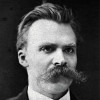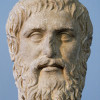“ The profession of an actor was regarded by him as a degradation of human nature, for 'one man in his life' cannot 'play many parts;' the characters which the actor performs seem to destroy his own character, and to leave nothing which can be truly called himself. Neither can any man live his life and act it. The actor is the slave of his art, not the master of it. ”
Plato, The Republic. copy citation
| Author | Plato |
|---|---|
| Source | The Republic |
| Topic | art actor |
| Date | |
| Language | English |
| Reference | |
| Note | Translated by Benjamin Jowett |
| Weblink | http://www.gutenberg.org/files/1497/1497-h/1497-h.htm |
Context
“Nor can he have been expected to look with favour on the licence of Aristophanes, now at the end of his career, who had begun by satirizing Socrates in the Clouds, and in a similar spirit forty years afterwards had satirized the founders of ideal commonwealths in his Eccleziazusae, or Female Parliament (Laws) .
There were other reasons for the antagonism of Plato to poetry. The profession of an actor was regarded by him as a degradation of human nature, for 'one man in his life' cannot 'play many parts;' the characters which the actor performs seem to destroy his own character, and to leave nothing which can be truly called himself. Neither can any man live his life and act it. The actor is the slave of his art, not the master of it. Taking this view Plato is more decided in his expulsion of the dramatic than of the epic poets, though he must have known that the Greek tragedians afforded noble lessons and examples of virtue and patriotism, to which nothing in Homer can be compared.”
source



